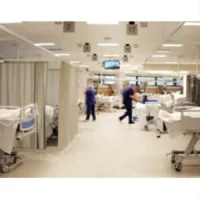With vast numbers of migrants and refugees reaching Europe over the last few years, what are the implications for intensivists? A session arranged by the Ethics section of the European Society of Intensive Care Medicine, which held its 30th congress in Vienna at the end of September, explored the issues.
Individual enthusiasm takes you only so far, said Christiane Hartog, MD, of the University Hospital of Jena, Germany. Institutional support, financing, surge capacity, and harmonisation of infection control measures are needed to deal with the health risk of migration.
Migrants may have long and difficult journeys to Europe from their countries of origin. They may pass through countries of transit, and sometimes stay in one country before arriving at their destination country. This influences the pattern of infectious diseases, including vaccine preventable diseases and emerging, forgotten or rare ones. The risk factors that predispose migrants for infectious diseases are war, particularly when it disrupts public health programmes such as vaccination. Other risk factors encountered during migration are overcrowded living conditions, lack of basic hygiene and infection control as well as living outdoors, exposure to low temperatures, limited access to drinking water and declining nutritional status. In such conditions respiratory, intestinal and meningocci pathogens are easily transmitted.
It is mostly the young and healthy who migrate, although ICU care is required for a small fraction. In addition to infectious diseases they may have trauma, rhabdomyolysis, acute liver or kidney injury, starvation, dehydration, acute encephalopathy, hypothermia, upper respiratory tract and diarrheal illnesses, emergent tuberculosis, hepatitis, malaria, vector-borne infections, meningitis, HIV and polio. There have been dramatic increases in some illness, such as measles, scabies and TB, and some infectious diseases rarely seen in developed countries have been encountered, such as louseborne fevers and wound infections. Hartog pointed out that active TB is only the tip of the iceberg. Many people are asymptomatic and the disease can reactivate at any time. Antimicrobial resistance is also a growing issue among refugees and asylum seekers.
ICU is just one part of the necessary response, which rests on the principle of distributive justice.
Should we triage?
Victoria Metaxa, of Kings College Hospital NHS Trust, London, considered whether intensivists needed to triage migrants and refugees, bearing in mind the difference in terminology (refugees are fleeing, while migrants have no impediment to return to their country of origin).
From a human rights point of view, it’s very clear what physicians should do, said Metaxa. While healthcare sometimes is rationed, whatever applies to the indigenous population should apply also to refugees. EU countries differ as to the level of healthcare they allow, however, (Eur J Public Health) with some not allowing access to emergency care for undocumented migrants.
A qualitative study published in BMC Research Notes looked at what physicians encountered looking after irregular
migrants across Europe in mental health services, accident and emergency
services and primary care, study. Commonly there were access
problems, limited communication and legal complications.
ICU care is costly and resources are finite. Not all countries have similar expenditure and ICU beds per population. European countries have ageing populations with increased co-morbidities as well as higher expectations that demand ICU admission. Migrant flow is not evenly distributed and immigration is irregular. So should we triage migrants? Yes, concluded Metaxa. We triage everybody. Should we triage someone because of their nationality, religion or legality of being in the country - No. Our job is to decide who will benefit from intensive care. This is a difficult job as it is. It's the policy makers’ job to do this. Any allocation rule should be overseen by a different institution, be transparent, accepted by all, and have meaningful public engagement.
End-of-life care
With basic ethical and legal principles in mind Andrej Michalsen, of Klinik Tettnang, Germany suggested that physicians have to consider what end-of-life care entails in the context of increased migration:
- Interdisciplinary deliberation
concerning the prognosis
- Elucidation of the patient’s
wishes regarding medical treatment
- (Interpretation of) advance
directives
- Appropriateness of care
- (Assessment of) cultural
relativism
- Interprofessional shared
decision-making
- Shared decision making with
patient and family
- Conflict resolution
- Limitation of life-sustaining therapies
- decision-making, implementation, and documentation
It’s not a checkbox process, he said. Each step requires thought and time and some understanding of culture, background, legality, ethical principles and so on.










